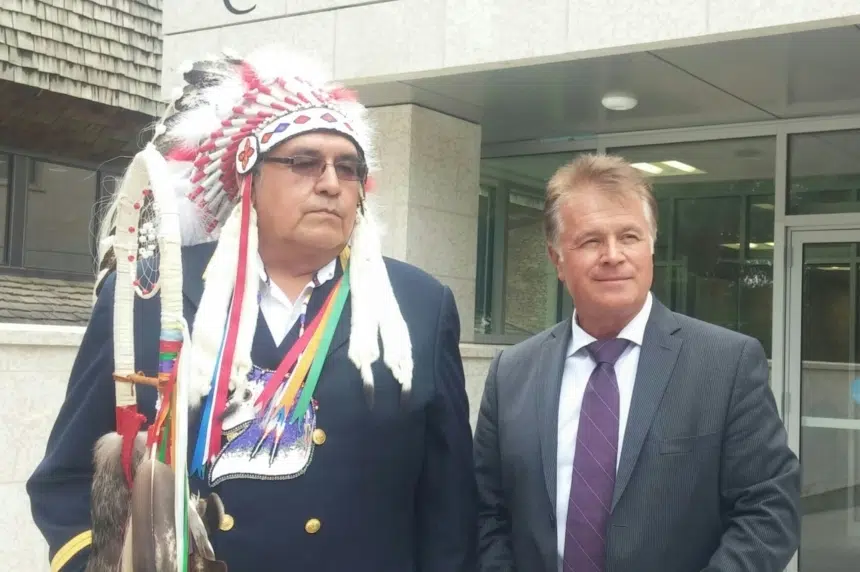With fires encroaching on her community for months over the summer, Lac La Ronge Indian Band Chief Tammy Cook-Searson is working diligently to catch up on getting the First Nation’s financial statements to Ottawa.
“We have not filed because of the wildfires in our area this summer,” Cook-Searson said in an email.
“We received an extension and it will be posted on or about Sept. 15, 2015.”
Lac La Ronge Indian Band was one of 23 First Nations in Saskatchewan whose names were still on the Aboriginal Affairs and Northern Development (AANDC) Website Friday morning for not completing their financials to be published online, in accordance with the First Nations Financial Transparency Act (FNFTA).
The deadline to supply the financial information was Tuesday morning and 197 First Nations across the country did not get them in on time. Three days later the number dropped to 182.
In Saskatchewan fires impacted some First Nations and others were working with Ottawa to comply in the coming weeks. Peter Ballantyne Cree Nation Chief Petter Beatty said because their First Nation comprises many small communities the financials are complicated and they were working with Pricewaterhouse Cooper to have them submitted in the coming weeks. Sweetgrass First Nation also said they were working on completing the audit and were in contact with Aboriginal Affairs.
First Nations that chose not to comply with FNFTA could lose their non-essential funding as a result.
“Those First Nation band councils which fail to comply by the deadline will receive several formal reminders. Beginning September 1st, 2015, bands that have yet to comply with the law will see funding for non-essential services withheld,” former Aboriginal Affairs minister and Candidate for Madawaska—Restigouche region Bernard Valcourt, said in an emailed statement .
“Further actions may include seeking court orders to compel compliance.”
Onion Lake Cree Nation has taken Ottawa to court to fight the constitutionality of FNFTA itself. Alberta’s Sawridge First Nation has also filed a separate case regarding the validity and constitutionality of the law. Those bands and three others are currently waiting for a ruling about whether they will be forced to publish their finances online after they chose to not comply for the 2013-14 year.
Onion Lake’s Chief Wallace Fox also wrote to the United Nations after the community lost it’s non-essential funding saying the law violates longstanding treaty rights.
Fellow and Canada Research Chair Ken Coates said the push back from a few First Nations is not about accountability, it’s about autonomy.
“The Government of Canada’s point of view is they passed a law … it’s like all the other laws that Canadians are expected to abide by,” Coates said on Mainstreet Thursday afternoon.
“First Nations are tired of being under the thumb of Aboriginal Affairs and Northern Development Canada (AANDC) … They want autonomy, independence, aboriginal self government and to be respected and recognized on a national basis.”
Coates explained that First Nations are also concerned that the accountability regulations will reveal information about their relationships with private companies and put them at an economic disadvantage.
“A lot of First Nations have deals with resource companies, mining firms, oil and gas companies, and those agreements have generally been confidential,” Coates explained. “First Nations are saying basically ‘you are putting us at a huge disadvantage.’ It’s going to make it harder to negotiate with companies, companies are going to be nervous about negotiating with First Nations because their deals with sort of come out in public.”
AANDC explained that the law was meant to provide all Canadians, including First Nations, with transparency and accountability from their governments. Valcourt said it “empowers First Nations and their members by applying the same principles of transparency and accountability to First Nation governments that already exist for other governments in Canada.”
In court in Saskatoon, lawyers for the First Nations argued that they are already accountable to their constituents.
Coates said that those different approaches will make it very difficult to find any sort of compromise.
“The Government of Canada knows that there is a fairly high-level of suspicion among non-aboriginal Canadians about the expenditure of aboriginal funds. I think the stereotypes of aboriginal governments that are getting massive big salaries and wasting all sorts of money are completely wrong,” he said.
“The vast majority of First Nations are well managed under very difficult circumstances. They don’t waste a lot of money, the salaries are not outrageous in the vast majority of cases. The public perception is very different so the Government of Canada wants to be seen to be tough, fair minded, but tough in terms of their relationship with First Nations.”







